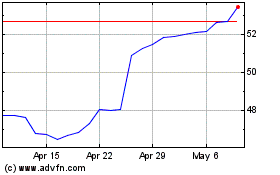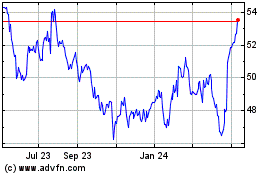Unilever Picks Rotterdam Over London for Headquarters -- 2nd Update
March 15 2018 - 6:34AM
Dow Jones News
By Saabira Chaudhuri and Costas Paris
LONDON -- Unilever PLC has decided to consolidate its dual
headquarters in Rotterdam over London, a politically charged move
that came despite last-minute lobbying from the British
government.
In a Wednesday board meeting, directors decided on the Dutch
city but Unilever executives were still receiving calls from the
U.K. government into the night, according to a person familiar with
the matter.
The company's announcement early Thursday came alongside details
of a broader restructuring of its operations into three divisions
with separate headquarters. Beauty and personal care, as well as a
home care unit, will be based in London, while its foods and
refreshment division will continue to be based in Rotterdam.
Unilever had for months wrangled with the question of where to
situate the combined company. The maker of consumer products such
as Magnum ice cream and Hellmann's mayonnaise currently splits its
headquarters between London and Rotterdam. That is a legacy of its
dual structure, which essentially consists of two separate British
and Dutch operating companies, each with its own shares.
The decision has taken on great significance in the U.K., which
is in the process of negotiating its exit from the European Union.
Critics of that move -- triggered by a 2016 referendum -- have
warned the split from the EU could force some big companies to move
to mainland Europe.
Unilever's finance chief, Graeme Pitkethly, said Thursday that
Brexit wasn't a factor in the decision to choose the Netherlands.
Unilever's decision reflected that shares in the Netherlands entity
made up about 55% of the combined ordinary shares for the group and
that these trade with greater liquidity than shares in the U.K.
entity, he added.
The company plans to continue to spend nearly GBP1 billion
annually in the U.K. including on research and development. The
7,300 people it employs in the U.K. and the 3,100 people in the
Netherlands won't be affected by the changes.
A U.K. government spokesman said the company had shown its
long-term commitment to the country by locating what the government
called its two fastest-growing divisions in the U.K., safeguarding
jobs and investment.
However, Rajesh Agrawal, London's deputy mayor for business,
described the move as "clearly disappointing news for the
capital."
Unilever shares fell about 1% in London and 0.7% in the
Netherlands in early trading, with analysts saying the move
shouldn't have a major impact for investors.
Following an unsolicited takeover approach by Kraft Heinz Co.
early last year, Unilever launched its review of that structure and
determined that unification was in the best interests of the
company and shareholders.
The company said the simplified structure will give it more
flexibility to make portfolio changes and help long-term
performance. It expects to make the change by the end of the
year.
The news on its legal base confirms a Wall Street Journal
article Wednesday that said the company's board had decided on the
Dutch city.
Critics of Unilever's current structure have complained it is
unwieldy and can interfere with deal making -- including by
hindering the company's ability to use stock to make big
acquisitions. The shares of the two operating companies, Unilever
PLC and Unilever NV, aren't convertible and the value of a single
share in each company must remain equal. That makes it tough to
issue new stock to fund a deal.
Unilever Chief Financial Officer Graeme Pitkethly in an
interview said Unilever's approach to acquisitions won't change
following its move to simplify its structure. The company has in
recent years favored small to midsize deals. But the new structure
gives Unilever the "strategic flexibility to act should the
opportunity arise," he added.
However, some analysts have questioned whether the company would
ultimately use equity to fund a deal.
The move to three divisions each with its own separate
headquarters will reduce centralization because each one will get
its own specific, tailored resources rather than sharing central
ones, said Mr. Pitkethly. It is part of a broader effort by
Unilever to push more resources to local markets and resembles
changes made by its sprawling rivals also seeking focus as fast
changing shopper behavior, the advent of e-commerce and
increasingly sophisticated local competition cap growth. Reckitt
Benckiser Group PLC, the owner of Durex condoms and Finish
dishwasher tablets, last year said it was splitting into two
divisions. Nestlé SA recently said its baby-foods business would be
regionally rather than globally managed.
Unilever plans to maintain listings in the Netherlands, the U.K.
and the U.S. and will remain subject to British and Dutch corporate
governance codes. Whether it will remain a component of the FTSE
100 depends on the exchange but Mr. Pitkethly noted that current
practice wouldn't allow Unilever to keep its place. The London
Stock Exchange didn't immediately respond to a request for
comment.
Write to Saabira Chaudhuri at saabira.chaudhuri@wsj.com and
Costas Paris at costas.paris@wsj.com
(END) Dow Jones Newswires
March 15, 2018 06:19 ET (10:19 GMT)
Copyright (c) 2018 Dow Jones & Company, Inc.
Unilever (NYSE:UL)
Historical Stock Chart
From Mar 2024 to Apr 2024

Unilever (NYSE:UL)
Historical Stock Chart
From Apr 2023 to Apr 2024
